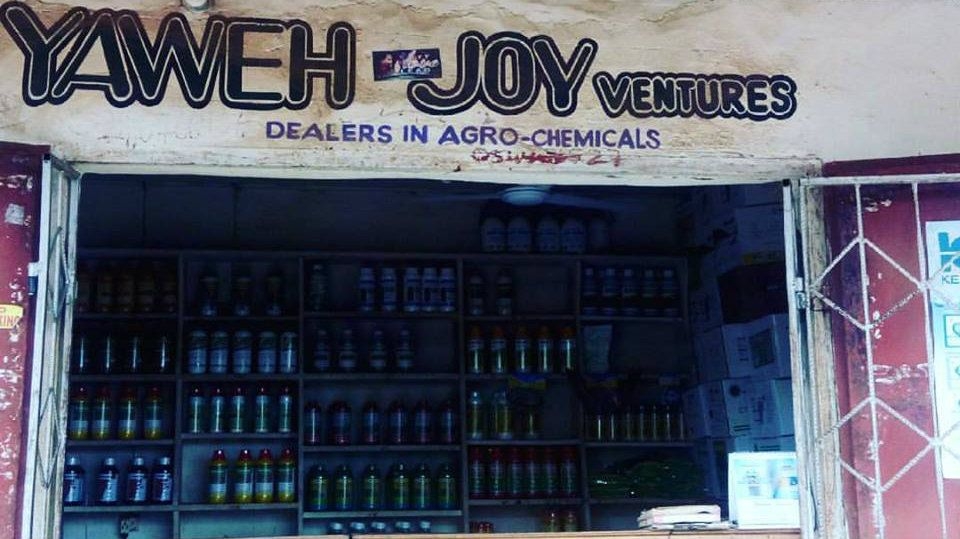
Kumasi, Ghana
Driving through Ghana’s Ashanti region, you quickly notice there are possibly as many churches as gas stations. Given the country’s 71% Christian population, it is not so surprising. What is surprising, however, is the names of the small-to-medium sized stores and businesses which dot the landscape: almost all of them have Christian-inspired names. “The Answering God Enterprise,” “Christ the Almighty Plumbing,” “Psalm 23 Catering,” and “Thank You Jesus Hardware.”
Coming from Nigeria’s south it feels familiar, as Christianity-inspired business names are also popular there. But here, with rows and rows of shops having names that include the words “Jesus,” “God” or a biblical reference, it’s almost overwhelming.
Despite the strong connection between faith and store names, business owners also manage to infuse doses of pop culture in their store signage.
“People don’t go to farm anymore. They rather would go to church with the hope that God will provide food.”
One business owner, who calls his shop “By His Grace Boutique,” had images of Chris Brown and Nicki Minaj on the signage alongside the business name, perhaps in a bid to attract a cool, hip clientele familiar with the American pop stars. Apparently, the nature of the businesses does not affect the possibility of a Christian-inspired name. “Don’t be surprised to find a pub or beer bar with a Christian name,” a local told me.
The trend is not restricted to the Ashanti region. Across Lower Manya Krobo, in Ghana’s Eastern region, you can spot even more shops with a variety of Christianity-inspired names: “My enemies are not God Stores,” “If God says yes who can say no Enterprises,” “Mount Zion Kline Water,” “Anointed Hands Beauty Care,” and “Yaweh Joy Ventures.” In the main cities, this trend is not as prominent, as multinationals and corporate offices mainly dominate.
Despite the strong connection between faith and store names, business owners also manage to infuse doses of pop culture in their store signage.
“People don’t go to farm anymore. They rather would go to church with the hope that God will provide food.”
One business owner, who calls his shop “By His Grace Boutique,” had images of Chris Brown and Nicki Minaj on the signage alongside the business name, perhaps in a bid to attract a cool, hip clientele familiar with the American pop stars. Apparently, the nature of the businesses does not affect the possibility of a Christian-inspired name. “Don’t be surprised to find a pub or beer bar with a Christian name,” a local told me.
The trend is not restricted to the Ashanti region. Across Lower Manya Krobo, in Ghana’s Eastern region, you can spot even more shops with a variety of Christianity-inspired names: “My enemies are not God Stores,” “If God says yes who can say no Enterprises,” “Mount Zion Kline Water,” “Anointed Hands Beauty Care,” and “Yaweh Joy Ventures.” In the main cities, this trend is not as prominent, as multinationals and corporate offices mainly dominate.For its part, the Ghana Pentecostal and Charismatic Council has requested government regulation targeted at checking the “activities of independent pastors and churches.” Debating the matter on a Ghanaian web forum, one user wrote: “Ghana is the only country in the world where church services are conducted Monday-Monday, 24 hours. People don’t go to farm anymore. They rather would go to church with the hope that God will provide food.” Another added: “Church is big business and you can launch it without regulation. Since there are no jobs, we will continue to see more ‘churches’.”
In a way, this fits with the religious trend across Africa, the world’s largest Christian continent. With a majority of the countries unequal in regard to wealth distribution and affluence, people increasingly turn to religion for succor and hope. Studies have shown that there is a correlation between religious devotion and economics. People are more likely to attend church in the world’s most unequal countries than they are in the most equal ones.
Perhaps wise to the prevailing realities, some African pastors now base their sermons on financial prosperity and freedom. In some cases, they offer business and career workshops. And so, increasingly, the church provides an alternate rhetoric in the chase for economic prosperity. Across many parts of rural Ghana, the belief in self-prophecy of a successful business (“God will provide Enterprises”) cannot be missed.
Credit: Quartz Africa


